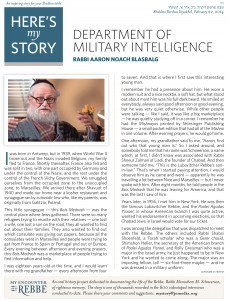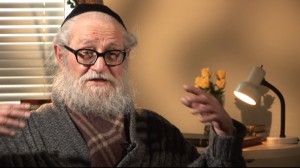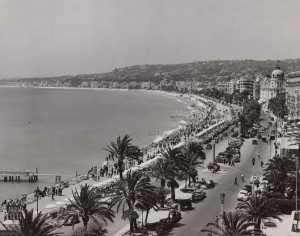HMS: Department of Military Intelligence
I was born in Antwerp, but in 1939, when World War II broke out and the Nazis invaded Belgium, my family fled to France. Shortly thereafter, France also fell and was split in two, with one part occupied by Germany and under the control of the Nazis, and the rest under the control of the French Vichy Government. We smuggled ourselves from the occupied zone to the unoccupied zone, to Marseilles. We arrived there after Shavuot of 1940 and made our home near a kosher restaurant and synagogue ran by a chasidic Jew who, like my parents, was originally from Galitzia, Poland.
This little synagogue – this Bais Medrash – was the central place where Jews gathered. There were so many refugees trying to reunite with their relatives – one lost a wife, one lost a son on the road; they all wanted to find out about their families. They also wanted to find out which consulate was giving out papers, because all the consulates were in Marseilles and people were trying to get from France to Spain or Portugal and out of Europe. Every evening between afternoon and evening prayers, this Bais Medrash was a marketplace of people trying to find information and help.
I was eighteen years-old at the time, and I would learn there with my grandfather – every afternoon from four to seven. And that is where I first saw this interesting young man.
I remember he had a presence about him. He wore a modern suit and a nice necktie, a soft hat, but what stood out about most him was his full dark beard. He smiled at everybody, always said good afternoon or good evening, but he was very quiet otherwise. While other people were talking – like I said, it was like a big marketplace – he was quietly studying off in a corner. I remember he had the Mishnayos printed by Shlesinger Publishing House – a small pocket edition that had all of the Mishna in one volume. After evening prayers, he would go home.
One afternoon, my grandfather said to me, “Aaron, find out who that young man is.” So I asked around, and somebody told me that his name was Schneerson, a name which, at first, I didn’t know was associated with Rabbi Shneur Zalman of Liadi, the founder of Chabad. And then someone told me, “This is the Lubavitcher Rebbe’s son-in-law.” That’s when I started paying attention. I would observe him as he came and went – apparently he was travelling a lot between Nice and Marseilles – but I never spoke with him. After eight months, he told people in the Bais Medrash that he was leaving for America, and that was the last I saw of him.
Years later, in 1956, I met him in New York. He was then the famous Lubavitcher Rebbe, and the Poalei Agudas Yisroel, in whose American branch I was quite active, wanted his endorsement in upcoming elections, so that Chabad Jews in Israel would vote for our ticket.
I was among the delegation that was dispatched to meet with the Rebbe. The others included Rabbi Shabsi Shoenfeld, a Torah scholar who was a Gerer chosid, Shimshon Heller, the secretary of the American branch of Poalei Agudas Yisroel, and Rolly Greisman who was a major in the Israel army; he just happened to be in New York and he wanted to come along. The major was an imposing fellow, tall – six-foot-three maybe – and he was dressed in a military uniform.
When we arrived, the Rebbe invited us all to sit down, and he immediately started asking us questions, even before we had a chance to tell him why we were there. He focused primarily on the major. He interrogated him about life in the IDF for what seemed to me more than two hours. I believe we arrived at about 11 p.m. and the meeting lasted until about 2 a.m.
The Rebbe said to the major, “Soldiers have spare time. What do they read?”
The major answered that there is a kiosk on every base where newspapers and magazines are available practically for free.
“Are any religious newspapers available?” the Rebbe wanted to know.
It turned out that Hatzofeh was the only one.
“What about religious books?” the Rebbe pressed on. When he heard that they were not available, he said, “They must be made available, maybe you can make it happen?”
The major didn’t know what to say, so he just sat there. Later, he told me, “What was I going to do, argue with a Rebbe?
Then the Rebbe took the conversation in an entirely different direction. He started talking about military matters. He began to ask about the tanks and armored personnel carriers. How thick were the protective steel plates on the sides? Were they straight or were they curved? Were they bent inwards or outwards?
The major wasn’t sure about it all. He said that the light ones had plates x centimeters thick – I don’t remember the numbers – while the heavy ones had plates double that.
“I don’t understand it!” the Rebbe exclaimed, “Why don’t they use heavier steel plates?”
The major had no answer.
Then he wanted to know what type of machine gun the Israeli army was using.
They had the Thompson machine gun at that time – American surplus from
the Second World War.
“Why don’t you buy machine guns from Sweden?” the Rebbe asked.
The major was surprised, “Why? What’s wrong with this one?”
The Rebbe had a ready answer. The Swedish gun shoots many more bullets per minute than the Thompson. And it has a greater velocity also.
For two hours, the Rebbe went through all the armaments – the infantry, the armored corps, the paratroopers. He had questions regarding every single detail.
When we walked out, the major said, “I’ve never seen such a thing! Even in the IDF we don’t have anybody who knows everything. Certain people know their areas, and others know other areas. But no one knows everything!”
But in that audience, the Rebbe did seem to know it all.
Rabbi Aaron Noach Blasbalg served as a member of the board of directors of Poalei Agudas Yisrael for 25 years. He was interviewed in his home in Brooklyn in January, 2009.
Dedicated in honor of








No Comments to “HMS: Department of Military Intelligence”